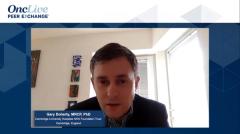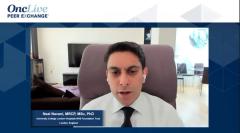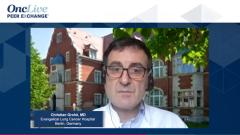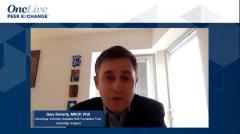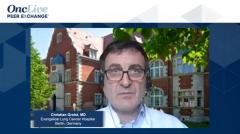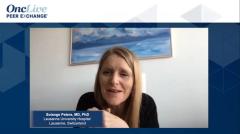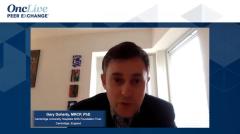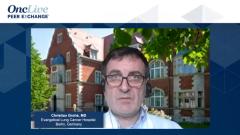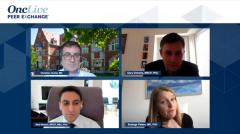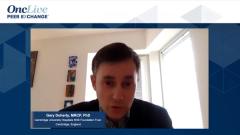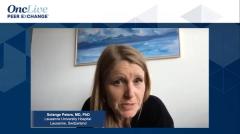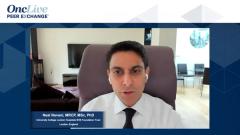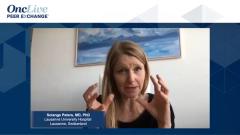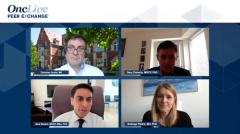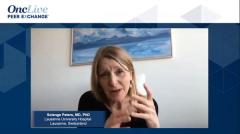
A Multidisciplinary Approach to Reflex Testing in NSCLC
Gary Doherty, MRCP, PhD, and Christian Grohé, MD, discuss the multidisciplinary approach to molecular testing for EGFR mutations in NSCLC and the importance of reflex testing to limit delays in receiving results.
Episodes in this series

Neal Navani, MRCP, MSc, PhD: Gary, if I could come to you, let’s talk about the multidisciplinary teams’ perspective on EGFR mutation testing. What is your view on who in the MDT [multidisciplinary team] is responsible for requesting molecular testing?
Gary Doherty, MRCP, PhD: I think as soon as one makes someone responsible, it should become routine. While it is important to have very clear communication channels within the multidisciplinary team—we have radiation oncologists, medical oncologists, thoracic surgeons, pulmonologists, specialists, nurses, etc—the key person is the specialist pathologist. The specialist pathologists, whenever they are looking at a specimen that is non–small cell lung cancer, nonsquamous, it should be absolutely routine to be requesting NGS [next-generation sequencing] as well as PD-L1 testing on these specimens. We owe it to our patients to get these results turned around in time. We must make sure that we do not offer patients suboptimal treatment strategies because we are delaying tests. I think it is crucial that these are done in a reflexive manner.
When we think about NGS, particularly, it can take quite a long time from requesting an NGS broad gene panel to getting an annotated clinical report. We need to make sure that we shave off as much time as possible by making this routine. Communication is critical, but we need to, in each of our practices, have an algorithm, essentially, for reflex testing. The MDT is important for things that lie outside that algorithm: for example, a pattern of disease that suggests that someone might have an oncogenic driver but doesn’t make the reflex criteria, or patients who are former or light smokers with squamous cell disease, etc. It is important that we have these clear MDT discussions to make sure patients get the most appropriate tests. Reflex testing must become routine.
Neal Navani, MRCP, MSc, PhD: Thanks, Gary. I entirely agree with that. I think reflex testing is an important part of modern thoracic oncology to get patients through to treatment as quickly as possible.
What is your view then on testing broadly for patients with early stage lung cancer? Should we be testing for all the mutations that we do for patients with advanced disease?
Christian Grohé, MD: Yes, what we do today at our centers [Evangelical Lung Cancer Hospital], or at least what we suggest certified lung cancer centers in our country do, is to test all patients who are eligible for systemic disease. That means that, ultimately, you test prior to any intervention: before surgery, before the patient enters the final decision with the MDT board. Basically, that also means that, if you go for the same signature as an NGS panel, and include NGS panels from patients from earlier stages, there are a lot of logistics and questions about reimbursement that we must discuss, too. Of course, we would like to have that information, and have it in our recommendations nationally and internationally, but we must realize that this is a question of reimbursement if you test all patients on a reflex basis. Yes, we do that, but this is because we have a large study unit, and we are interested in understanding all the upcoming profiles of patients, like those, for instance, with early failure after a curative intended surgery. We have to find out what are the failure patterns in these patients based on a molecular profile.
Neal Navani, MRCP, MSc, PhD: Given that 40% to 50% of patients who are undergoing surgery may develop relapsed disease, your view then is if the funding is in place, we should be testing broadly up front. Is that correct?
Christian Grohé, MD: Yes, sure, we should do that for 2 reasons. One reason to test is to find out the best treatment pattern for all patients. In an adjuvant setting, we can clearly extend the proportion of patients who undergo adjuvant treatment. We do see an elderly population who undergoes surgery, which is an excellent new pattern. We have identified elderly patients who will have curative intended surgery, but we do not see the same proportion of patients who will undergo adjuvant treatment because cisplatin-based chemotherapy is not tolerable for all our patients. So, in a situation where we have detected a driver mutation, and therefore, we go directly to adjuvant treatment without using platinum-based chemotherapy, as shown in recent data, that would be very helpful. Identifying less toxic treatment options with fewer adverse events—that would be helpful. We would like to see more data on that and to have a better understanding of what to do with these patients in the future.
Neal Navani, MRCP, MSc, PhD: Gary mentioned the importance of reflex testing for all of our patients with lung cancer. Christian, do you do that routinely for patients who have had a biopsy prior to surgery?
Christian Grohé, MD: Yes, but this is a large academic center and we have reimbursement patterns that are not completely based on the reimbursement from the standard of care of insurance companies. This is the question, how will you have funding? For instance, at the moment, we do not have an approval for adjuvant or neoadjuvant treatment options with TKIs [tyrosine kinase inhibitors] in our country.
Transcript Edited for Clarity


